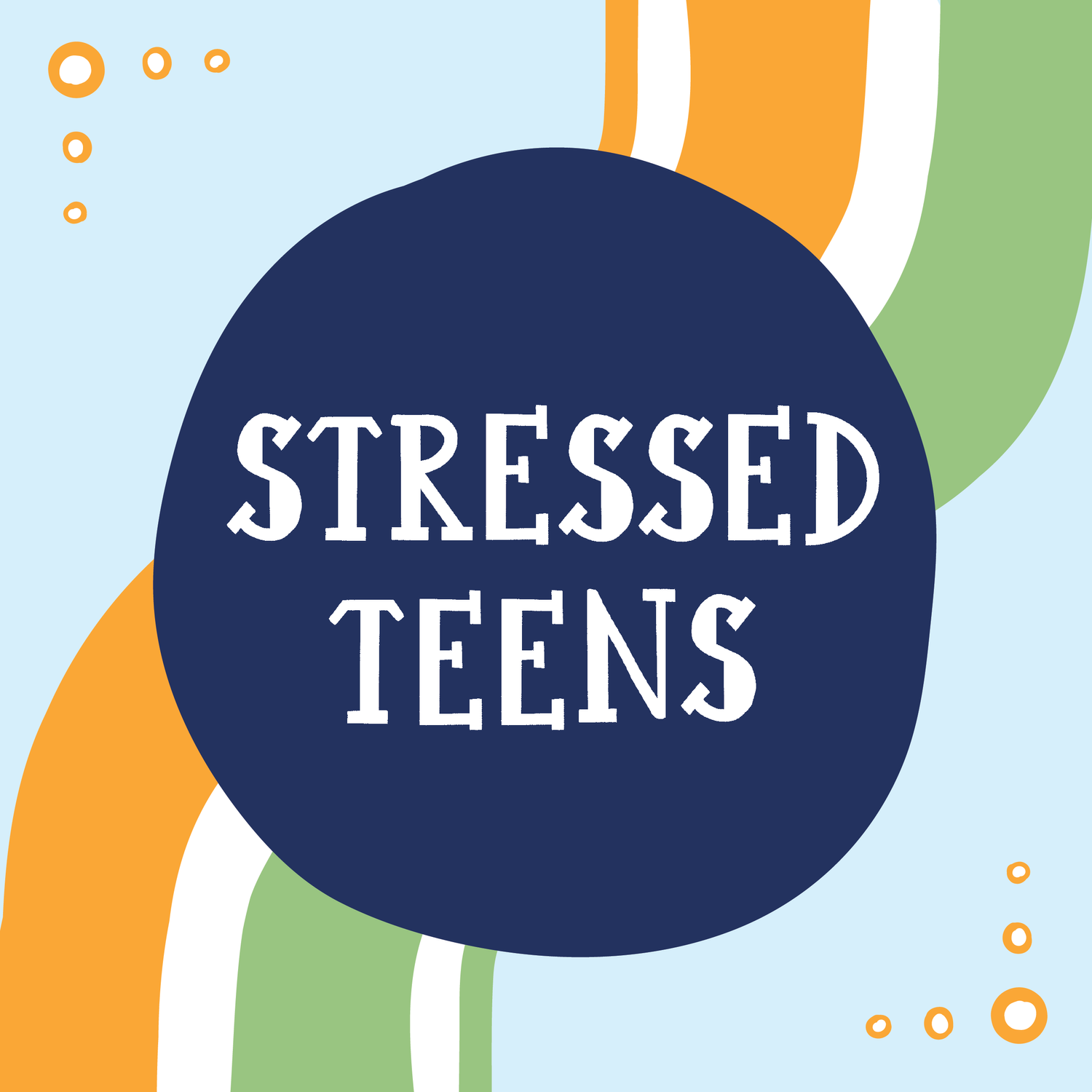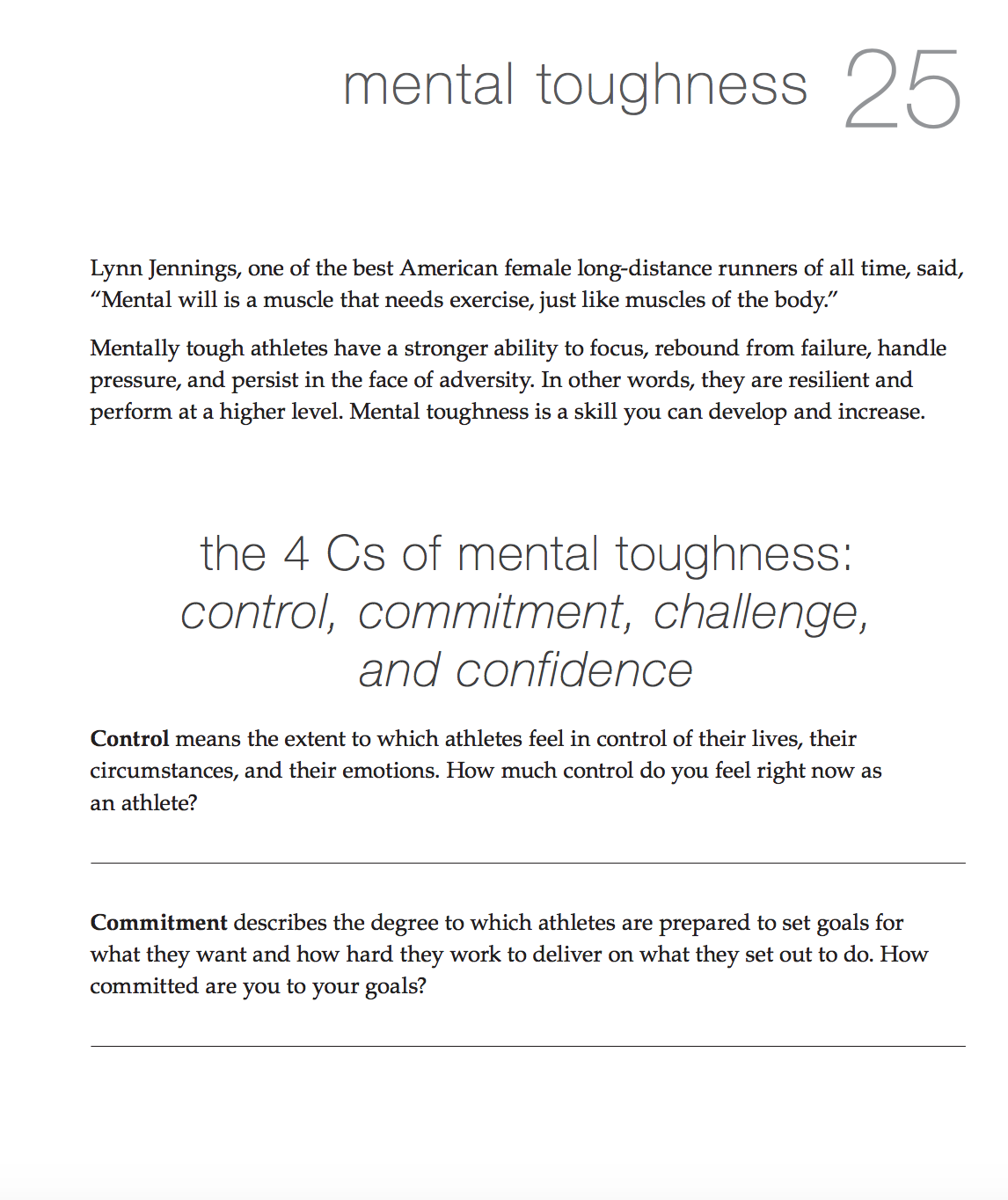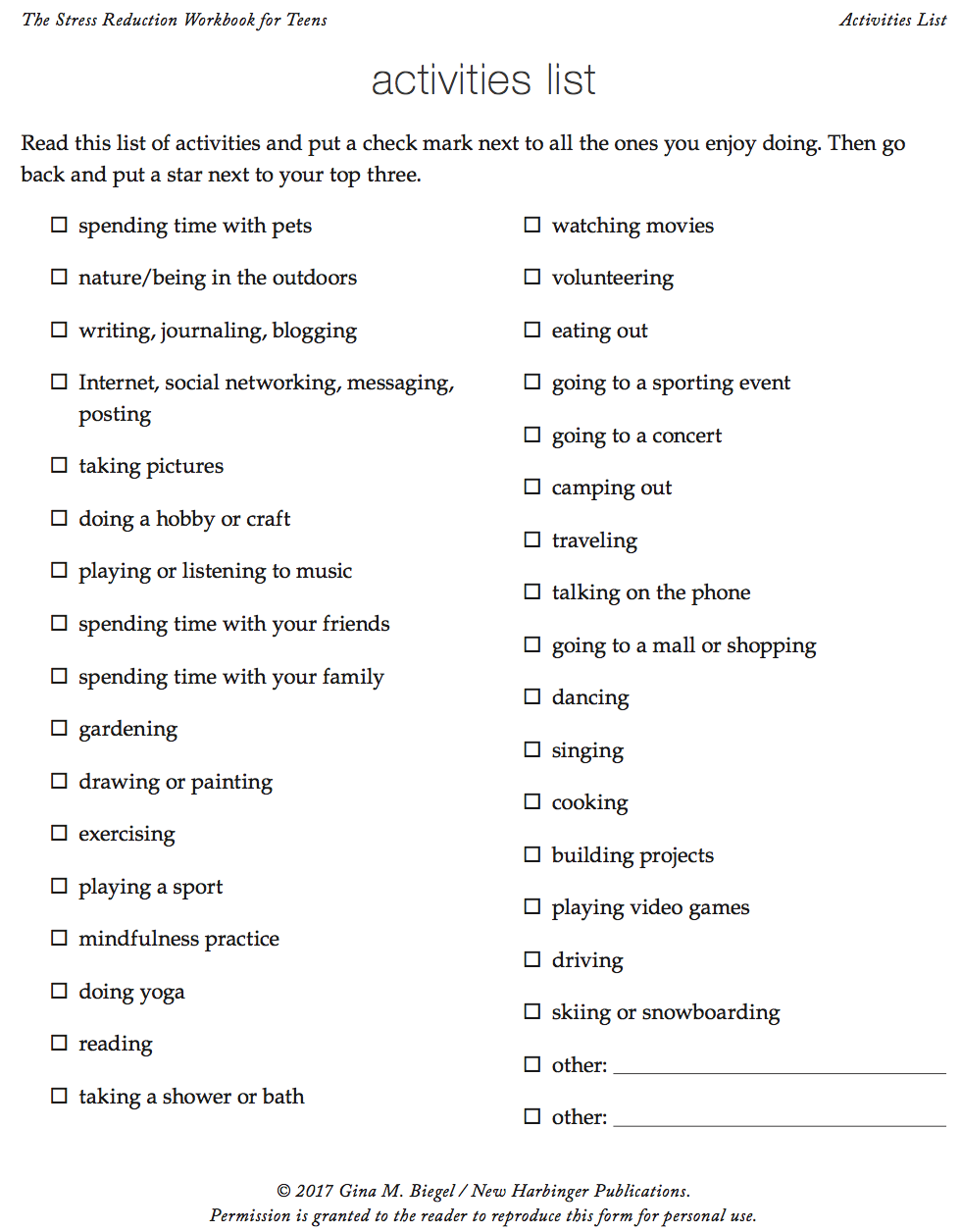These activities are presented more thoroughly in the Stress Reduction Workbook for Teens and Be Mindful & Stress Less: 50 Ways to Deal With Your (Crazy) Life and other publications.
1. Stop what you’re doing and count your breaths to 10.
2. Devote your awareness to more of the pleasant and beneficial moments in your day.
3. Accomplish only one task at a time. You will be more productive than if you split your attention to multiple tasks.
4. Start a daily gratitude journal. Each day, consider the big things you’re grateful for, like your family, friends, health or home. Also, don’t forget the little things you’re thankful for, such as a cup of coffee or a hug.
5. Get some form of exercise every day. Even a 15-minute walk can do wonders for the mind.
6. Spend time outdoors enjoying nature. Notice the power of grounding by paying attention to your feet on the ground.
7. Begin a daily mindfulness practice. Start with 10 minutes and work your way up.
8. Commit to a nourishing self-care routine with a caveat to set incremental goals you can accomplish. You do not have to overdo it.
9. Acknowledge the positive qualities of your family, friends and others in your inner circle. Let them know how much they mean to you. Let them know you see them and hear them.
10. Carve out daily enrichment time such as learning an instrument or creating artwork. Bring mindful attention, paying notice to your five senses, to anything you do in your daily life.
Tips courtesy of Gina Biegel, CEO and founder of Stressed Teens; Jem Shackleford, head of curricula for Mindfulness in Schools Project; and Tris Thorp, author and coach.
Keynote Speech Broward Mental Health Summit - Adam Avin, Wuf Shanti Children's Wellness Foundation
You can bring mindful presence to anything you do, including homework and tests. Click Here to Download this Activity.
Reread what you have written before you hit send or post.
Pause for a second or two before you hit send or post to make sure you want to.
Ask yourself if the message you are going to send has been thought out, is not rushed, and has a purpose.
Check in with how you are feeling emotionally and physically right now. What emotions are you having? What red flags, signals, or cues is your body giving off?
Note: If you are feeling jealous, angry, frustrated, sad, or depressed, or experiencing any other negative emotion, consider pausing and not messaging or posting right now.
Click on the feeling clouds activity to have a page to explore how you are feeling right now.
It is vital that you work on ways to care for yourself as you would your friends or family members. Research shows that you can't truly care for others if you don't take care of yourself first. Consider filling in the heart with the people, places, things, and situations that nourish and fill up your 'heartspace'. You can also consider coloring it in, listing your feelings or thoughts in it, or give it to a friend.
· Practice the mindfulness practices you have been learning.
· Set realistic goals for yourself.
· Say kind things to yourself.
· Eat healthy foods.
· Get enough sleep.
· Exercise.
· Notice positive thoughts and give less attention to negative ones
· Have compassion for yourself.
· Ask for help when you need it.
· Turn off technology when it is negatively impacting your life.
· Do something that makes you smile.
· Listen to your favorite (cheerful) song.
· Spend time with people in your life who build you up; for example, friends or family members.
· Do something you love that would be considered healthy, even if it is just for a minute or two
· Look at or be with nature.
Self-care is defined as giving attention to your physical and psychological well-being. A helpful way to think about the importance of self-care is to imagine you are a water bottle and the water inside is your “energy.” You pour yourself out all the time into many “cups” representing everything and everyone requiring your time, your attention, your energy: friends, school, family—the list goes on and on. Your water bottle would constantly be empty if you didn’t refill it regularly. When you engage in self-harming behaviors, thoughts, and feelings, it’s like poking holes in your water bottle that cause the water to drain out. Think of self-care activities as the opposite: as ways to refill your bottle. Who are the people, places, things, situations, that keep your water bottle full? List them on the downloadable handout. You can also color it if you want and put your favorite quotes, words, song lyrics, books, hobbies, etc.
The opposite of self-care is self-harm. Below is a list of ways you might be hurting yourself.
· Cutting (cuts or severe scratches with a sharp object)
· Carving words or symbols on the skin
· Picking or scratching the skin
· Piercing the skin with sharp objects
· Head-banging
· Hitting or punching oneself
· Burning
· Interfering with wound healing
· Self-embedding of objects
· Pulling out hair
· Eating: Bingeing, purging, and restricting
· Using/abusing drugs or alcohol
· Ingesting toxic substances or objects
· Sexual promiscuity
· Self-exploitation
· Posting that is harming
· Making harming videos
If you are engaging in any of the above self-harm behaviors please consider telling someone you can trust a school counselor, a family member, a friend, or if in immediate danger call 911.
Below is a list of resources you can call for additional assistance and information:
CALL 911
National Suicide Hotline: 1-800-SUICIDE (784-2433) or the
National Suicide Prevention Lifeline: 1-800-273-TALK (8255)
Both toll-free, 24-hour, confidential hotlines which connect you to a trained counselor at the nearest suicide crisis center.
Suicide Prevention Lifeline
The Web site for this 24-hour, confidential hotline offers details about how to call if you need help, how to identify suicide warning signs, and information for veterans experiencing mental distress. National Suicide Prevention Lifeline: Visit https://suicidepreventionlifeline.org or call 1-800-273-8255.
List of International Suicide Hotlines: Visit http://www.suicide.org/international-suicide-hotlines.html
Crisis Text Line: Visit https://www.crisistextline.org, or text HOME to 741-741.
National Hopeline Network: Call 1-800-784-2433.
National Safe Place: Visit National Safe Place Website or text 44357.
National Alliance on Mental Illness (NAMI): Visit www.nami.org or call 1-800-950-6264.
Society for Adolescent Health and Medicine (SAHM): Visit https://www.adolescenthealth.org/Home.aspx
Love Is Respect: Visit www.loveisrespect.org, text LOVEIS to 22522, or call 1-866-331-9474.
National Eating Disorders Association: Visit www.nationaleatingdisorders.org or call 1-800-931-2237.
Erica’s Lighthouse: A Beacon of Hope for Adolescent Depression: Visit www.erikaslighthouse.org
LGBTQ Resources: Visit www.glaad.org/youth or www.gsanetwork.org
LSEN (an organization that focuses on LGBTQ issues in education): Visit www.glsen.org
Teens Against Bullying: Visit www.pacerteensagainstbullying.org
This website and these resources are not meant to take the place of counseling or mental health assistance or help. Working through some of these activities might bring up painful emotions or memories that require the support of a mental health professional. Please talk with a mental health professional or an adult you trust to discuss these issues further.















































































